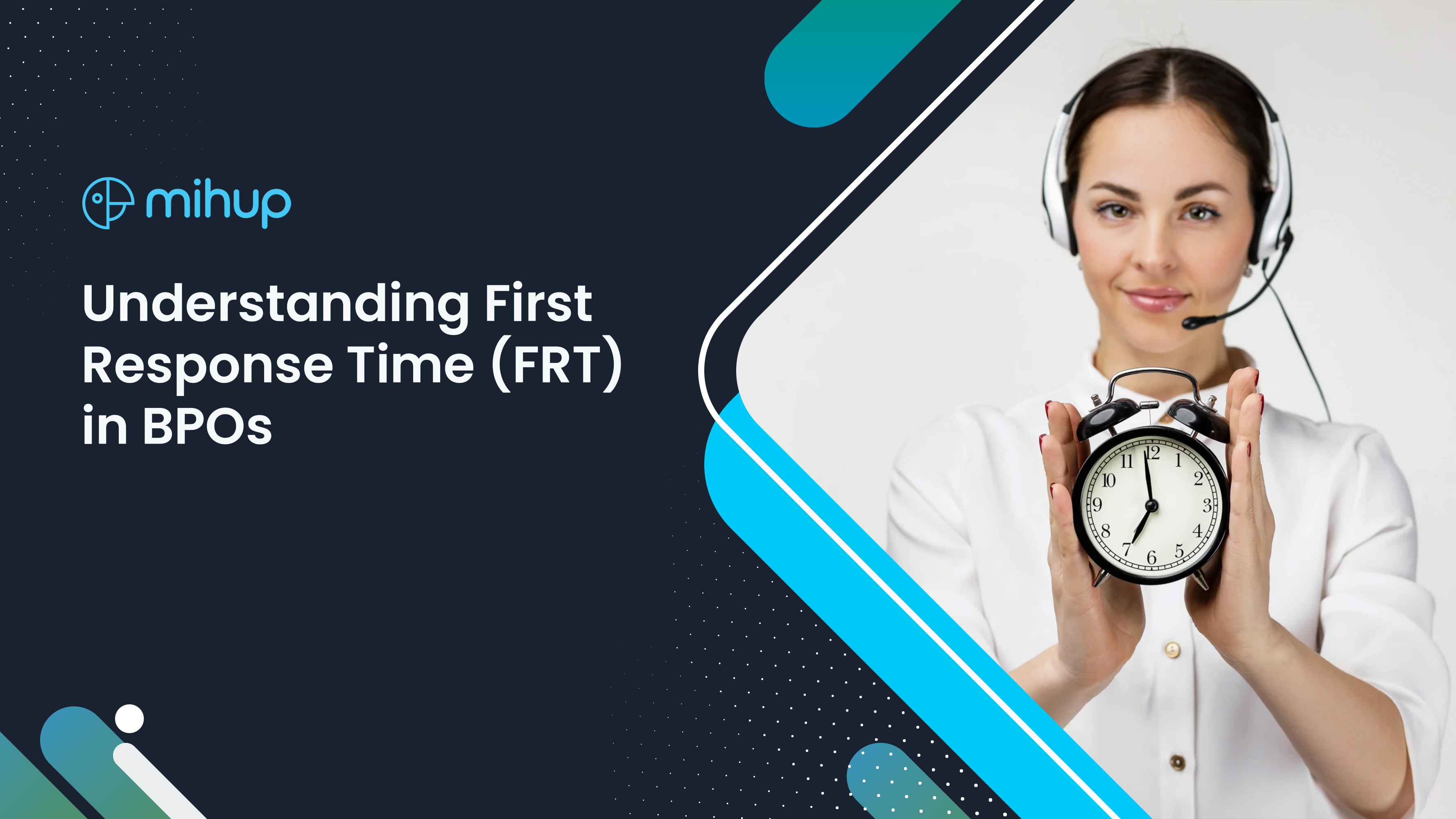For the BPO industry, efficiency is as important as Customer experience. BPOs handle various tasks, from customer support to data entry, and ensuring prompt responses is crucial for maintaining client satisfaction and operational excellence. This is where First Response Time (FRT) steps in as a pivotal metric in the realm of BPOs.
What is FRT?
First Response Time (FRT) is a vital metric for BPOs. It quantifies the efficiency and responsiveness of customer service operations. At its core, FRT encapsulates the time taken by a BPO agent to address the initial interaction or inquiry initiated by a customer or client.
Imagine a scenario where a customer contacts a BPO seeking assistance, whether it’s a query about a product, a service issue, or a general inquiry. FRT measures the duration from the moment this query is received by the BPO to the moment the first meaningful response is provided back to the customer. This response could take various forms depending on the communication channel utilized, such as a phone call, email, chat message, or social media interaction.
The significance of FRT lies in its ability to gauge the speed and effectiveness of customer service delivery. In today’s fast-paced digital landscape, where instant gratification is often expected, customers value swift and efficient responses to their inquiries. A prompt initial response not only demonstrates attentiveness and professionalism but also lays the foundation for a positive customer experience.
FRT is typically measured in units of time, such as seconds, minutes, or hours, depending on the specific requirements outlined in the BPO’s service level agreements (SLAs). These SLAs often delineate performance benchmarks and expectations regarding response times, allowing BPOs to align their operations with client needs and industry standards.
For instance, in a high-volume call center environment catering to urgent customer queries, FRT may be measured in seconds to ensure rapid assistance and minimize wait times. Conversely, in a less time-sensitive context, such as email support for non-urgent inquiries, FRT may be evaluated in terms of minutes or hours.
Why is FRT Relevant for BPOs?
Impact on Customer Experience
For BPOs, customer satisfaction is most important. FRT directly influences the customer experience and perception of service quality.
- Swift Response Enhances Satisfaction: A swift response to customer queries not only enhances satisfaction but also contributes to customer retention and loyalty.
- Negative Effects of Prolonged FRT: Conversely, prolonged FRT can lead to dissatisfaction, frustration, and potential loss of business opportunities.
Key Performance Indicator (KPI)
FRT serves as a key performance indicator (KPI) for BPOs. It reflects the efficiency of internal processes, agent productivity, and adherence to SLAs.
- Insights into Operational Efficiency: By monitoring and optimizing FRT, BPOs can streamline operations and improve service delivery.
- Agent Performance Evaluation: FRT serves as a benchmark for agent performance evaluation, helping identify areas for improvement and targeted interventions.
Read our blog: Understanding the Importance and Benefits of Contact Center Metrics and KPIs
Business Implications
FRT has broader implications for business success beyond immediate customer satisfaction.
- Impact on Customer Retention: High FRT can lead to increased churn rates as customers seek quicker resolutions elsewhere.
- Positive Experiences Drive Growth: Positive experiences resulting from prompt responses can lead to word-of-mouth recommendations and increased customer advocacy, driving business growth and profitability.
How to Calculate FRT?
Calculating FRT involves simple arithmetic based on timestamps of query receipt and response. The formula for FRT is:
FRT = Time of First Response − Time of Query Receipt
For instance, if a customer query is received at 10:00 AM and the first response is provided at 10:15 AM, the FRT would be 15 minutes.
What are the Ways BPOs Can Reduce FRT?
Reducing First Response Time (FRT) is a critical objective for BPOs aiming to enhance customer satisfaction and operational efficiency. Achieving this goal necessitates a multifaceted approach that integrates technological innovations, process optimization strategies, and targeted agent training initiatives.
One particularly impactful solution gaining prominence in the BPO industry is Speech Analytics, which revolutionizes FRT reduction by leveraging advanced technologies such as Natural Language Processing (NLP) and Machine Learning (ML) to analyze and derive insights from customer-agent interactions.
Speech Analytics: Revolutionizing FRT Reduction
Read our blog: Speech Analytics: What Is It And What It Can Do?
Read our blog: Turning Every Call into Gold: How Contact Center Speech Analytics is Transforming the Industry
Speech Analytics offers a range of capabilities that empower BPOs to streamline operations, optimize resource allocation, and deliver exceptional customer experiences:
Real-time Monitoring and Alerting
Speech Analytics enables BPOs to monitor customer conversations in real time, identifying keywords or phrases indicative of urgent queries or dissatisfied customers. By promptly detecting these signals, BPOs can alert agents to prioritize responses, minimizing FRT and ensuring timely issue resolution.
Automated Call Routing
Integrating Speech Analytics with call routing systems facilitates intelligent call distribution based on query complexity, agent expertise, and workload. By analyzing conversation content and context, Speech Analytics helps route high-priority calls to available agents with the requisite skills, thereby expediting response times and optimizing resource allocation.
Agent Performance Optimization
Speech Analytics provides valuable insights into agent performance and adherence to response protocols. By analyzing communication patterns, tone, and language proficiency, BPOs can identify areas for improvement and deliver targeted training interventions. Equipped with actionable feedback, agents can enhance their efficiency and effectiveness in handling customer queries, consequently reducing FRT.
Predictive Analytics for Demand Forecasting
Speech Analytics, when coupled with Predictive Analytics, empowers BPOs to anticipate fluctuations in query volume and resource requirements. By analyzing historical data and identifying patterns, BPOs can forecast peak demand periods and proactively allocate resources accordingly. This proactive planning minimizes wait times, ensures optimal staffing levels, and reduces FRT during high-demand periods.
Continuous Process Improvement
Speech Analytics facilitates continuous process improvement through comprehensive performance analysis. By tracking FRT trends, identifying bottlenecks, and benchmarking against industry standards, BPOs can iteratively refine their processes to enhance efficiency and responsiveness. This iterative approach fosters a culture of continuous improvement and drives sustained reductions in FRT, ultimately enhancing customer satisfaction and operational effectiveness.
First Response Time (FRT) is a critical metric for BPOs, influencing customer satisfaction, operational efficiency, and profitability. By leveraging innovative solutions such as Speech Analytics, BPOs can streamline operations, optimize agent performance, and deliver exceptional customer experiences. Through proactive monitoring, intelligent routing, and continuous process improvement, BPOs can effectively reduce FRT and position themselves for long-term success in the dynamic BPO landscape.





